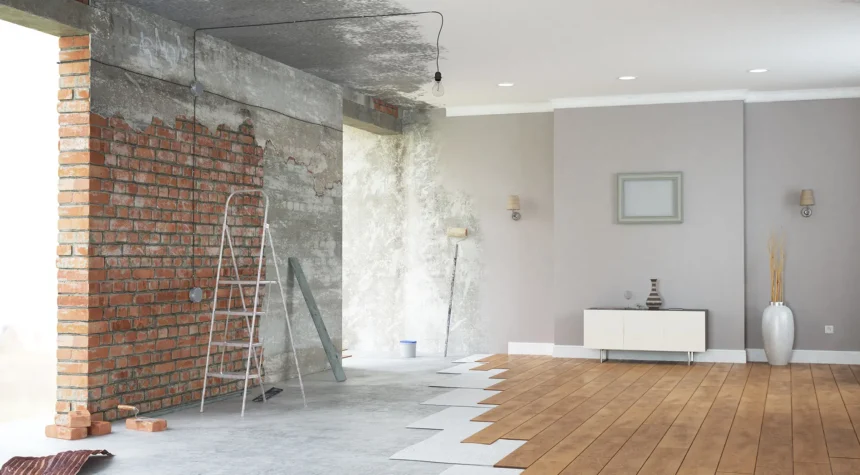Building services encompass a wide range of tasks involved in the construction of new structures. These services can include everything from laying foundations, erecting frameworks, plumbing, electrical work, and finishing touches like painting and flooring. The primary goal is to create a new structure that meets the client’s specifications, adhering to safety standards and building codes.
What Are Renovation Services?
Renovation services, on the other hand, focus on updating, improving, or restoring existing structures. These services may involve cosmetic changes like repainting or more extensive work like reconfiguring the layout, replacing old systems, or enhancing structural integrity. The objective is to make an existing building more functional, aesthetically pleasing, and compliant with current standards.
Types of Building Services
Residential Construction
Residential construction involves building new homes or residential buildings. These projects require careful planning to ensure that the structures are safe, functional, and meet the needs of future occupants. This includes everything from single-family homes to apartment complexes.
Commercial Construction
Commercial construction includes the development of office buildings, retail spaces, hotels, and other commercial properties. These projects often require coordination with various stakeholders, strict adherence to commercial building codes, and efficient project management to minimize disruption to business operations.
Industrial Construction
Industrial construction focuses on facilities like factories, warehouses, and plants. These projects typically require specialized knowledge to accommodate machinery, safety protocols, and efficient workflows within the industrial environment.
Types of Renovation Services
Interior Renovations
Interior renovations might involve updating kitchens, bathrooms, living spaces, or entire floor plans. This could include installing new cabinetry, countertops, flooring, lighting, and other fixtures to enhance the functionality and appearance of the space.
Exterior Renovations
Exterior renovations aim to improve the outside of a building. This could involve updating the facade, landscaping, roofing, windows, and doors. These changes not only enhance curb appeal but can also improve energy efficiency and structural integrity.
Structural Renovations
Structural renovations are essential for maintaining the safety and longevity of a building. This could include repairing or replacing foundations, beams, and load-bearing walls. Ensuring that the structure is sound is critical for the safety of its occupants and the longevity of the property.
Choosing the Right Building and Renovation Service
Research and Recommendations
Start by researching local building and renovation services, look for companies with good reviews, a strong portfolio of completed projects, and recommendations from friends or family. Checking references and testimonials can provide insight into the quality of their work and customer satisfaction.
Licensing and Insurance
Ensure that the service provider is licensed and insured. Licensing indicates that they meet local regulatory standards, while insurance protects you from potential liabilities during the project. Always ask to see proof of both before signing any contracts.
Detailed Contracts
A detailed contract is essential for protecting both parties. It should outline the scope of work, timelines, costs, payment schedules, and any other relevant details. Make sure you understand all terms and conditions before signing.
Communication and Transparency
Choose a service provider who communicates clearly and transparently. Regular updates, open lines of communication, and honesty about potential challenges and changes are crucial for a successful project. Good communication ensures that you are informed and involved throughout the process.
Key Steps in the Building and Renovation Process
Planning and Design
The planning and design phase is crucial for the success of any construction or renovation project. This involves understanding the client’s vision, creating detailed blueprints, and obtaining necessary permits. Architects, engineers, and designers work together to ensure that the project is feasible and meets all regulatory requirements.
Budgeting and Financing
Proper budgeting is essential to avoid unexpected costs and ensure the project stays on track. This includes estimating the costs of materials, labor, permits, and any additional expenses. Securing financing, whether through loans, grants, or personal funds, is also a critical step in this phase.
Permits and Regulations
Compliance with local building codes and regulations is mandatory. This involves submitting plans for approval, obtaining necessary permits, and ensuring that all work is inspected and approved by local authorities. Failure to comply can result in fines, delays, and potential legal issues.
Construction Phase
During the construction phase, all planned work is executed. This includes site preparation, foundation laying, framing, electrical and plumbing installation, and finishing touches. Effective project management is essential to coordinate various trades, manage timelines, and ensure quality workmanship.
Quality Control and Inspections
Quality control is a continuous process throughout the construction phase. Regular inspections are conducted to ensure that work meets the required standards and adheres to the approved plans. Any issues identified are addressed promptly to avoid future problems.
Final Walkthrough and Handover
Once construction is complete, a final walkthrough is conducted with the client to ensure satisfaction with the work. Any remaining issues or touch-ups are addressed before the final handover. The client receives all necessary documentation, including warranties and maintenance instructions.
Benefits of Professional Building and Renovation Services
Expertise and Experience
Professional builders and renovators bring a wealth of knowledge and experience to the table. They understand the intricacies of construction, local regulations, and the best materials and practices for each project. Their expertise ensures that projects are completed efficiently, safely, and to a high standard.
Time and Cost Efficiency
Hiring professionals can save time and money in the long run. They have established relationships with suppliers, can source materials at better prices, and have the skills to complete work more quickly and accurately than an amateur. This efficiency translates into cost savings and a faster project turnaround.
Enhanced Property Value
Quality construction and renovation work can significantly enhance the value of a property. Whether it’s a new build or an updated existing structure, professional workmanship ensures that the property is attractive, functional, and meets modern standards, making it more appealing to potential buyers or tenants.
Stress Reduction
Managing a construction or renovation project can be overwhelming. Professionals handle all aspects of the project, from planning and permits to construction and finishing touches. This allows clients to focus on their daily lives without the added stress of managing a complex project.
Conclusion
Building and renovation services are integral to creating and maintaining functional, safe, and aesthetically pleasing structures. Whether you’re constructing a new home, renovating an office, or updating a factory, professional services ensure that the project is completed to the highest standards. By understanding the different types of services, key steps in the process, and the benefits of hiring professionals, you can make informed decisions and achieve your construction or renovation goals with confidence.



